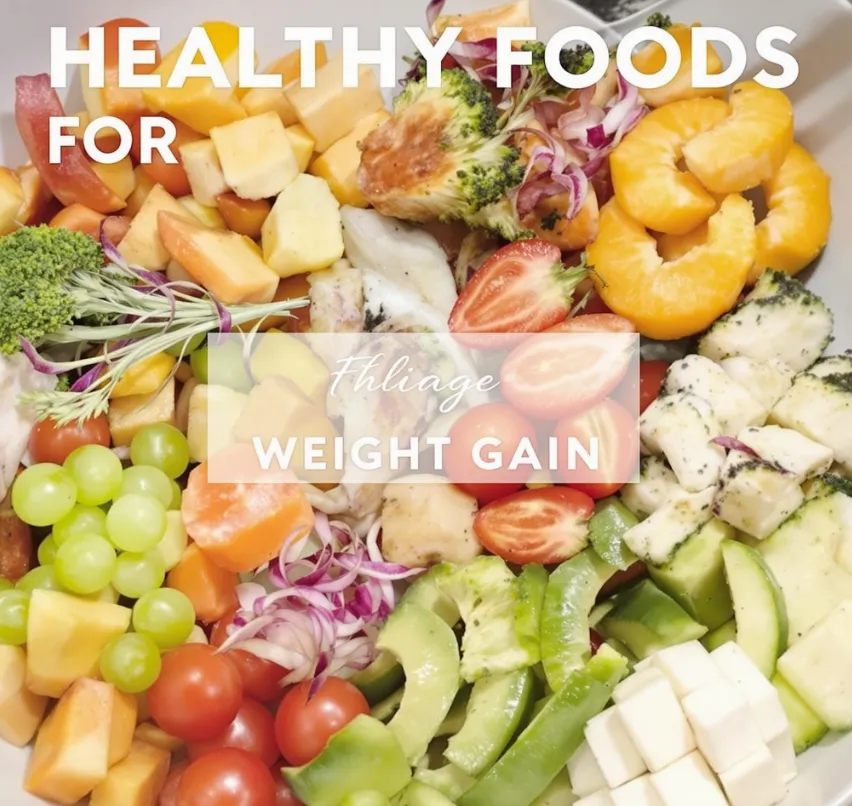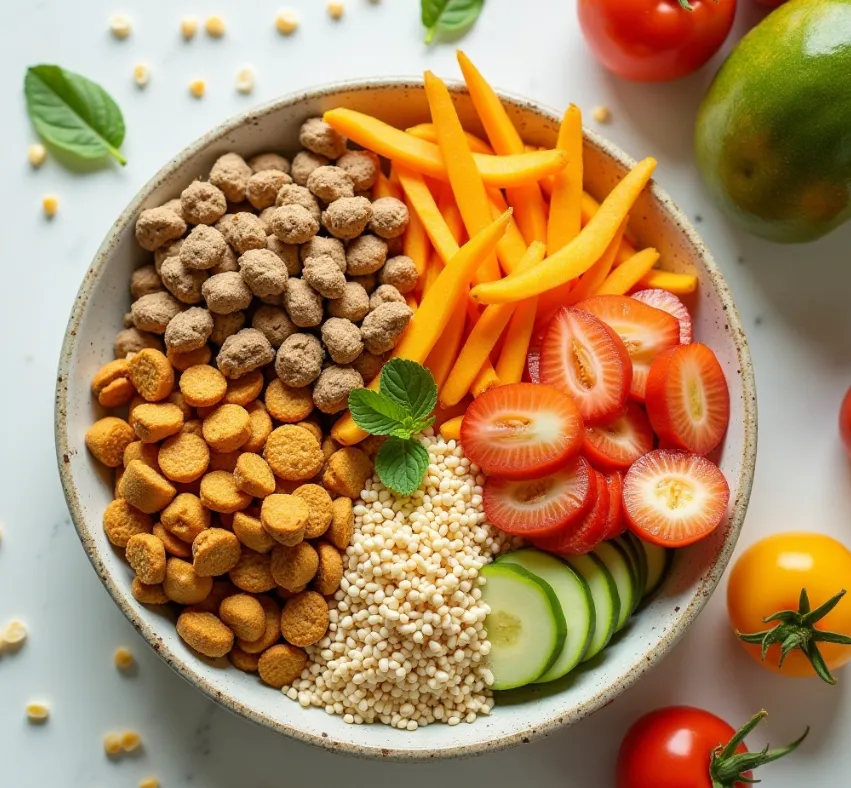Guide to Healthy Foods for Weight Gain
Guide to Healthy Foods for Weight Gain. For many people, gaining weight can be just as challenging as losing weight is for others. Whether you’re recovering from an illness, looking to build muscle, or simply trying to reach a healthier weight, the key is to gain weight in a nutritious way rather than consuming empty calories. This article explores the best healthy foods and strategies for gaining weight effectively.

Why Healthy Weight Gain Matters
Gaining weight shouldn’t mean loading up on processed foods high in unhealthy fats and sugars. Instead, the focus should be on nutrient-dense foods that provide your body with the calories, protein, and other nutrients it needs to build muscle and increase overall body mass in a healthy way.
“Gain weight gradually by adding healthy calories—adults could try adding around 300 to 500 extra calories a day,” recommends the NHS.
Boost Very High Calorie Vanilla Nutritional Drink – 22g Protein, 530 Nutrient Rich Calories, 8 Fl Oz (Pack of 24)
Water, Glucose Syrup, Canola Oil, Acid Casein (From Milk), Soy Protein isolate, and Less than 2% of sugar, Vitamins, and minerals Soy Lecithin, salt, Natural and Artificial Flavor, Citric acid, Taurine, Carrageenan.
Convenient Weight Gain Support: BOOST Very High Calorie Nutritional Drink provides a high calorie, high protein, nutrient, helping you to gain weight or maintain weight.

Protein-Rich Foods for Weight Gain
1. Red Meats
Red meats like beef and pork are excellent for muscle building. A 3 oz (85g) serving of steak provides about 228 calories and 24g of protein, along with leucine—a key amino acid that stimulates muscle protein synthesis. Choosing fattier cuts can provide additional calories to support weight gain goals (peakhealthinsights).
2. Salmon and Oily Fish
Salmon and other fatty fish offer high-quality protein and beneficial omega-3 fatty acids. A single fillet of wild Atlantic salmon (3 oz) delivers approximately 155 calories, 7g of healthy fats, and 22g of protein. Whether grilled, baked, or added to salads, salmon is versatile and nutritious (peakhealthinsights).
3. Whole Eggs
Eggs are among the most nutritious foods available. One large egg provides about 74 calories, and the yolk contains most of the beneficial nutrients. They’re incredibly versatile and can be prepared in numerous ways—from omelets and scrambles to adding them to salads and sandwiches for extra protein and calories (peakhealthinsights).
4. Protein Supplements
For those struggling to get enough protein through whole foods, protein supplements can be valuable. Whey protein is particularly effective, especially when combined with resistance training. A review of 74 studies found that protein supplementation at or above 1.6g per kilogram of body weight improved lean body mass when paired with resistance exercise (peakhealthinsights).
Calorie-Dense Carbohydrates

1. Rice
Rice is an affordable, convenient source of carbohydrates that helps increase calorie intake. One cup of cooked white rice provides 204 calories and 44g of carbs. Its versatility allows it to be paired with various proteins and vegetables for balanced, high-calorie meals (peakhealthinsights).
2. Potatoes and Other Starchy Vegetables
Complex carbohydrates like potatoes, sweet potatoes, corn, and squash not only add calories but also increase glycogen stores in muscles, which is important for energy during physical activity. These foods also provide essential nutrients and fiber (peakhealthinsights).
3. Whole Grain Bread and Cereals
Whole grain products offer more nutrients than refined alternatives. Creating calorie-dense sandwiches with proteins, healthy fats (like avocado), and whole-grain bread is an excellent way to increase calorie consumption, according to Medical News Today.
4. Oats and Granola
Oatmeal cooked with whole milk provides about 150 calories per cup, and you can boost this further by adding toppings like nuts, seeds, dried fruit, honey, or nut butter. Granola, which combines cereals, dried fruit, and nuts, can provide 200-300 calories in just half a cup.
Healthy Fats for Calorie Boosting
1. Avocados
Avocados are calorie-dense fruits packed with healthy monounsaturated fats. One large avocado contains around 365 calories, 30g of fat, and 17g of fiber, along with numerous vitamins and minerals. They can easily be added to sandwiches, smoothies, salads, or simply enjoyed on toast (peakhealthinsights).
2. Nuts and Nut Butters
Nuts and nut butters provide a concentrated source of calories, healthy fats, and some protein. For example, one tablespoon of almond butter contains about 98 calories. A small handful of almonds (1/4 cup) provides approximately 170 calories, 6g of protein, and 15g of healthy fats (peakhealthinsights).
3. Olive Oil and Other Healthy Oils
Oils are among the most calorie-dense foods available. Adding just one tablespoon (15ml) of olive oil to dishes adds 120 calories. Other beneficial oils include avocado oil, walnut oil, and coconut oil (peakhealthinsights).
4. Dark Chocolate
Quality dark chocolate with at least 70% cacao is not only delicious but also nutrient-rich. A 100g bar with 60-75% cacao provides around 600 calories and contains beneficial micronutrients, fiber, magnesium, and antioxidants (peakhealthinsights).
Dairy Products for Weight Gain
1. Whole Milk
Milk has been used as a weight gainer for decades, offering a balance of proteins, carbs, and fats. One cup of whole milk provides approximately 149 calories and 8g of protein. Studies have shown that milk can help build muscle when combined with weight training (peakhealthinsights).
2. Full-Fat Greek Yogurt
Greek yogurt made with whole milk delivers a nutritional profile that includes protein, carbs, and fat. A half-cup serving of plain, whole milk Greek yogurt provides about 165 calories and 15g of protein. Add toppings like granola, fruit, honey, or nuts to create high-calorie, nutritious snacks (peakhealthinsights).
3. Cheese
Cheese is calorie-dense and rich in protein and calcium. Just one ounce of cheddar cheese contains 110 calories and 7g of protein. It can easily be incorporated into various dishes to boost calorie and nutrient content.
Convenient Calorie Boosters
1. Dried Fruit
Dried fruits are high in natural sugars and calories. They contain fiber and most of their vitamins and minerals remain intact when dried. Dates, for example, are versatile and nutritious—two Medjool dates provide about 130 calories.
2. Homemade Protein Smoothies
Smoothies allow you to consume a lot of calories without feeling overly full. Try these combinations:
- Chocolate banana nut shake: Combine 1 banana, 1 scoop of chocolate whey protein, and 1 tablespoon of nut butter
- Vanilla berry shake: Mix 1 cup of berries, 1 cup of Greek yogurt, and 1 scoop of vanilla whey protein
- Super green shake: Blend 1 cup of spinach, 1 avocado, 1 banana, 1 cup of pineapple, and 1 scoop of protein powder
These smoothies typically provide 400-600 calories each.
3. Cereal Bars
Quality cereal bars can be convenient snacks when you’re on the go, typically containing 150-200 calories per bar. They’re especially good before or after training sessions, as they provide both slow- and fast-digesting carbohydrates (peakhealthinsights).
Practical Strategies for Healthy Weight Gain
1. Eat More Frequently
Rather than trying to eat three large meals, try eating smaller meals every 3-5 hours throughout the day. This approach can make it easier to consume more total calories Memorial Hermann.
2. Focus on Nutrient Density
Choose foods that provide substantial nutrients along with calories. This ensures your weight gain supports overall health rather than just increasing body mass.
3. Prioritize a Hearty Breakfast
Start your day with a calorie-dense breakfast including foods like granola, nuts, nut butters, seeds, dried fruit, Greek yogurt, eggs, avocado, or smoothies Memorial Hermann.
4. Don’t Forget the Bedtime Snack
Add a protein-rich snack before bed, such as Greek yogurt with fruit, string cheese with crackers, or a milk-based smoothie. This provides your body with nutrients for overnight recovery and growth, Memorial Hermann.
( Foods to avoid for hormonal acne. Hormonal acne affects millions of people worldwide, causing frustrating breakouts that seem to appear without warning and resist traditional treatments. While genetics and hormones play significant roles in acne development, emerging research reveals that diet can be a powerful trigger—or ally—in managing hormonal acne. Understanding which foods to avoid can be a game-changer in your journey toward clearer, healthier skin.
5. Combine Exercise with Increased Calories
Pairing your increased caloric intake with strength training helps ensure that the weight gained is primarily muscle rather than fat. Resistance exercise directs extra calories toward muscle building.
Sample Weight Gain Meal Plan
Breakfast:
- 2 cups of oatmeal made with whole milk
- 1 banana
- 2 tablespoons of almond butter
- 1 tablespoon of honey
- 1/4 cup of walnuts
Mid-Morning Snack:
- 1 cup of Greek yogurt with 1/2 cup granola and 2 tablespoons of honey
- 1 handful of dried fruit
Lunch:
- Sandwich with 3 slices of whole grain bread
- 4 oz of chicken or turkey
- 1/2 avocado
- 1 slice of cheese
- Side of fruit and nuts
Afternoon Snack:
- Protein smoothie with milk, protein powder, banana, and nut butter
- 1 cereal bar
Dinner:
- 6 oz of salmon
- 1 cup of brown rice
- 1 cup of roasted vegetables with olive oil
- Side salad with olive oil dressing
Evening Snack:
- 1 cup of cottage cheese with honey
- 1 handful of mixed nuts




